Rushden Echo, 7th July 1944, transcribed by Peter Brown
Missing In France - R I C S Employee Who Fought In Egypt
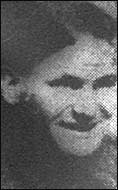 L. Cpl Paul Chambers Harris, younger son of Mr and Mrs G H Harris, of 19, Hall avenue, Rushden is “missing” in France according to an official notice received by his parents last Friday. L. Cpl Paul Chambers Harris, younger son of Mr and Mrs G H Harris, of 19, Hall avenue, Rushden is “missing” in France according to an official notice received by his parents last Friday.
L. Cpl Harris is 24 years of age and joined the Army in 1940. He first went overseas more than two years ago and was badly wounded in the battle of El Alemein. For six months he was in hospital and convalescence camps, but later rejoined his unit and served in Italy.
Prior to call-up he worked at the R.I C.S. grocery store in High-street South. As a boy he was educated at the Alfred-street and Intermediate schools and went through the Mission Sunday School. His elder brother is a Sick Berth Attendant in the Royal Navy, and a married sister resides at Wellingborough.
|
Rushden Echo & Argus, 7th July 1944, transcribed by Kay Collins
Rushden Corporal Wounded
Cpl. Alexander (Jock) Irvine, youngest son of Mrs. J. Irvine, of 1a Bedford-road, Rushden, has been wounded in the Central Mediterranean theatre of war. His mother was informed last Friday morning but no details are yet available.
Cpl. Irvine is 23 years of age. He came to Rushden when 14 years of age and worked in the leather industry at Higham Ferrers. He was called up with the Territorials at the beginning of the war and went overseas in March of this year.
|
|
The Rushden Echo and Argus, 7th July, 1944, transcribed by Gill Hollis
General Praises Naafi Man
Rushden Driver’s Front-Line Service in Italy
A signal from Lieut.-General Sir Oliver Leese, K.C.B., C.B.E., D.S.O., to the officer commanding Naafi’s Expeditionary Force Institutes, Italy, brings news of a Rushden man with fighting Naafi mobile canteens serving the Eighth Army.
From Lieut.-General Leese came the message: “Lance Corporal Head of the Naafi refreshment van ‘No Orchids For,’ is doing good work with the forward troops.”
Lance-Corpl. James William Head, E.F.I., driver-charge-hand of “No Orchids For” is 28, married, and lives at “Woodsmoor,” Wellingborough-road, Rushden. He joined Naafi three years ago after serving in the Royal Corps of Signals, and has been with Naafi overseas less than a year. Before the war he lived at Hayes, Middlesex, his marriage to Miss Winifred North, daughter of Mr. and Mrs. G. S. North, of Rushden, taking place in 1942.
Early In Rome
Two Naafi mobile canteens continually in the forefront in the Italian campaign are now asked for by name. Their fame is widespread among Fifth Army men. A “Recce” officer says that on one occasion one of the mobile canteens actually served cups of “chah” to “Recce” parties behind the Boche line. The two vans were serving refreshments in Rome on the same day that the Allies entered the city.
One C.O. writes: “We are the most forward troops, 300 feet from the Boche, who is active with mortars. The Naafi van ‘No Orchids For’ has just brought my lads valuable Naafi supplies which were more than welcome, and in my opinion they are truly living up to the Naafi motto, ‘Servitor Servientium.’
Under Fire
The officer commanding an ack ack regiment reports: “Naafi mobile gave this unit service under direct enemy observation by Piedimonte. The men were just emerging from the trenches after heavy shelling when the mobile canteen arrived.”
|
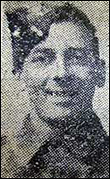 Evening Telegraph, 11th July 1944, transcribed by Kay Collins Evening Telegraph, 11th July 1944, transcribed by Kay Collins
Rushden Man is Jap Prisoner
Missing since the fall of Java, Pte. “Dick” Britten, of a Light Anti-Tank Regiment, is now known to be a prisoner of the Japs.
His father, Mr. J. Britten, baker, of Grove-road, Rushden, was informed on Monday by a postcard which told him that his youngest son was in excellent health and sent love to all.
Pte. Britten is 28, and before joining the Army assisted his father in the bakery business. He went overseas early in 1941, and this has been the first news of him since he was officially reported missing.
|
Rushden Echo & Argus, 14th July 1944, transcribed by Kay Collins
Rushden Rail Clerk’s Greeting – Home Guard Work Recalled
A cheery letter has been sent by Corporal Harry Langham, R.E., of Rushden, from France. He was a clerk at the goods department of the Rushden station before joining up.
Corporal Langham who used to be a member of the Home Guard has sent the letter to one of his G.H. friends—Mr J B Larman, manager of the Home and Colonial stores at Rushden.
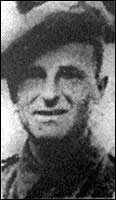 He writes: “You will observe from the enclosed photograph that I am standing up to things very well and that I appear, and in fact am, very fit. This photograph was taken last week by an excitable Frenchman and I hope it will prove of interest to my many friends who still continue to devote their excellent qualities to the Home Guard. He writes: “You will observe from the enclosed photograph that I am standing up to things very well and that I appear, and in fact am, very fit. This photograph was taken last week by an excitable Frenchman and I hope it will prove of interest to my many friends who still continue to devote their excellent qualities to the Home Guard.
“It is nearly a month since I paddled ashore, and, as you will have noticed, operations have gone very well to date. I am continually looking for some familiar faces but none have appeared so far.
“Enclosed you will also find a sample of “D Day” money which I thought you might like to keep as a souvenir. We came here with our pockets full but there is little opportunity of spending it.
“The ‘Echo’ has continued to arrive and, although generally out of date, it does enable me to follow the happenings at home very well.”
Corporal Langham has sent a specimen of the new five francs (to which the letter refers).
|
Rushden Echo & Argus, 14th July 1944, transcribed by Kay Collins
Injured Soldier in Hospital
Back in this country from France with burns to the hands and face, Trooper Edward Jesse Roberts, Royal Tank Regt., of Rushden, has been visited by his mother in hospital and found to be “comfortable.”
Tpr. Roberts’ home is at 7 Orchard-place. Aged 23, he has been in the Army for four years and has served in the Middle East, Sicily and Italy.
|
|
Rushden Echo & Argus, 14th July 1944, transcribed by Kay Collins
Rushden Neighbours Meet in Cairo
Next door neighbours of Oval-road, Rushden, had a meeting in Cairo on Easter Saturday. The pair were A.C.1 Gwilyn Pritchard, R.A.F., eldest son of Mr and Mrs S Pritchard, of 29 Oval-road, and Trooper Frank Mitchell, R.A.C., youngest son of Mr and Mrs Mitchell, of 31 Oval-road.
A.C.1 Pritchard joined the R.A.F. three years ago and went abroad two years ago. He served in East Africa for 18 months and the Middle East for 12 months where he met Frank for the first time in two years. He has since moved on to Aden. His brother, David, is stationed with the R.A.F. in England.
Trooper Mitchell joined the R.A.C. at 19 years of age and has been overseas for two years, first in Egypt and now in Italy. He has two brothers in the forces—the eldest, Philip, is in England and Percy who served in the M.E. from El Alamein to Tunis with the Desert Rats is now in France.
|
Rushden Echo, 14th July 1944, transcribed by Peter Brown
Injured Soldier in Hospital
Back in this country from France with burns to the hands and face, Trooper Edward Jesse Roberts, Royal Tank Regt, of Rushden, has been visited by his mother in hospital and found to be "comfortable.”
Tpr. Roberts' home is at 7, Orchard Place. Aged 23, he has been in the Army for four years and served in the Middle East, Sicily and Italy.
|
|
Rushden Echo & Argus, 14th July 1944, transcribed by Kay Collins
Rushden Man Praised – Led Party from Danger Spot
Sergt William George Goode, of Hall-avenue, Rushden, serving with the Warwickshire Regiment in France, has been given a special word of praise for the way he successfully led a party out of danger in an action in which his Regiment was involved.
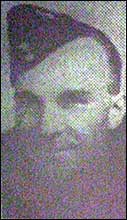 It was a case in which the Warwickshires were strongly represented on the beach on “D Day” when a British Infantry Division was given the task of securing the left flank of the Allied force, the flank bounded by the Canal de Caen and the River Orne. It was a case in which the Warwickshires were strongly represented on the beach on “D Day” when a British Infantry Division was given the task of securing the left flank of the Allied force, the flank bounded by the Canal de Caen and the River Orne.
The Royal Warwickshire Regiment had an action all to themselves on Wednesday, June 7th in Lebisey Wood. Through this wood runs a road to Caen, and the point reached by the Royal Warwickshires was considerably in advance of the other troops in the British force. It was known that the wood was occupied, but the exact strength of the enemy had not been measured.
Several companies of the regiment penetrated the wood, and came under heavy fire. The enemy seemed to be all round them in strongly defended localities. Enemy tanks were there too. Many of the attacking troops spent 12 hours in the wood and were engaged in heavy fighting most of the time. The Warwicks eventually withdrew, with casualties, to Bieville, which is also on the Caen road.
Major R G Krever, of Oxford, who gave an account of the action had a special word of praise for Sergt W G Goode, of Rushden, who successfully led a party out of the danger spot.
Sergt Goode, aged 29 years, was born at Rushden but spent most of his life at Wellingborough, until his marriage in November 1939, to Miss Margaret Lord, of Earls Barton, the couple then coming to reside in Hall-avenue.
He has been in the Army over four years and the whole of that period was spent in this country until going to France. As a boy he was educated at the Victoria-road school, Wellingborough and afterwards worked for the C.W.S. Boot Works at Rushden. He is the only son of Mr and Mrs T Goode, who reside at 12 The Drive, Wellingborough.
|
Rushden Echo, 14th July 1944, transcribed by Peter Brown
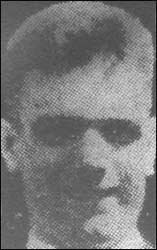 In Jap Camps - Rushden Men’s Message - First News for Years In Jap Camps - Rushden Men’s Message - First News for Years
The first news for two-and-a-half years has come from L/Bdr. R. C. Dix, R.A., to his wife Mrs E. Dix, of 32, Highfield-road, Rushden and this is one of the usual printed postcards, with the appropriate sentences conveying the news that he is excellent health and is in a Japanese internment camp in Thailand. He is apparently working "for pay," and he sends his greetings to his two children (a boy and a girl).
L/Bdr. Dix, who worked in Messrs Whitworth's mill at Wellingborugh, was a reservist in the R.A. and had about three months' service to do to complete his term, when war broke out. Actually on military duty at the time of the outbreak, Mr Dix, in the words of his wife, was "in France in a few hours." He came back in the retreat from Dunkirk and later was sent to the Far East on February 15th, 1942. Mrs Dix was informed that he was reported missing. The next news came this week.
|
Rushden Echo & Argus, 21st July 1944, transcribed by Kay Collins
Rushden Scouts’ Happy Meeting
News has been received from L.A.C. Jones, of 2 York-road, Rushden and L.A.C. L Rootham, of Newton-road, Rushden, of a surprise meeting in the Malcolm Club at Naples.
These two R.A.F. men were former scoutmasters at St Mary’s, Rushden. L.A.C. Rootham, who was the former scoutmaster, went overseas in July 1943, first to North Africa and then to Italy.
L.A.C. Jones was the assistant scoutmaster and he went abroad in March 1943, to North Africa and then Italy. His former scouting colleague is the first local man he has met out there.
It is understood from their letters that they had a very enjoyable day together on June 30th at the Malcolm Club and the Royal Palace and talked of their many mutual friends and scouts. They send greetings to all their old fellow scouts, wherever they may be, and hope soon to have a happy reunion.
A picture was taken to commemorate the occasion. [We could not get a good enough copy to reproduce here]
|
Rushden Echo & Argus, 21st July 1944, transcribed by Kay Collins
Killed in Burma - Rushden Worker in Fatal Accident
Mr and Mrs A Safford, of 1 Upper Queen-street, Rushden, have been informed that Pte Dai Pickton, R.A., has been accidentally killed in Burma.
Pte Pickton had lived with them for five years previous to joining the Army just before the outbreak of war, and worked for Messrs Bignells, Ltd., in Crabb-street. He was 24 years of age and his parents live in Rhondda, Glamorgan, Wales. He had been abroad for about four years.
[Not found on CWGC]
|
Rushden Echo & Argus, 21st July 1944, transcribed by Kay Collins
Rushden Youth’s Serious Wounds - Injured in India
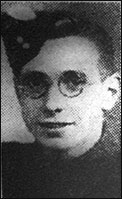 Mr and Mrs F Lawson (sic), of 23 Wentworth-road, Rushden, have been informed that their youngest son, Pte Denis Lawman, Northamptonshire Regt., has been wounded in the Indian theatre of war. Mr and Mrs F Lawson (sic), of 23 Wentworth-road, Rushden, have been informed that their youngest son, Pte Denis Lawman, Northamptonshire Regt., has been wounded in the Indian theatre of war.
Pte Lawman has been wounded through the neck, has a fractured jaw and facial injuries. He is 20 years of age and has been in the Army for 20 months, and abroad since last October. Formerly he was employed by Mrs E Thompson, butcher, of Higham Ferrers and was educated at the Alfred-street school.
His elder brother is with the Army in France and the only sister is in the W.A.A.F.
|
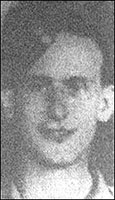 Rushden Echo & Argus, 21st July 1944, transcribed by Kay Collins Rushden Echo & Argus, 21st July 1944, transcribed by Kay Collins
Rushden Man on Ferry Control – Promoted to Warrant Officer
For the past twelve months on ferry control from this country to Algiers and Gibraltar and back the active R.A.F. career of Warrant Officer Horace Roberts, elder son of Mrs F Roberts, of 20 Irchester-road, Rushden, has been interesting.
Joining the R.A.F. in 1939, he went to the Middle East in 1941, and returned here from one tour of bombing operations in 1942. Another tour, bringing his total operations up to about 58, was done out there, and he came back again early in 1943. The airmen encountered one stoke of bad luck in November 1942, when he was badly wounded, accidentally, by a hand grenade. In addition he has been mentioned in dispatches.
During this period he held the rank of Flight Sergeant and was promoted to Warrant Officer two months ago. Before service, he was employed by Messrs John White’s Newton-road factory. He used to attend Rushden Adult School. He was educated at the Alfred-street school and is now 23 years of age.
His younger brother, Pte E L Roberts, R.A.S.C., is serving in France.
|
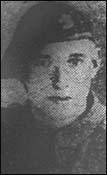 Rushden Echo, 4th August 1944, transcribed by Peter Brown Rushden Echo, 4th August 1944, transcribed by Peter Brown
Shrapnel Wounds - Trooper Hit in Leg and Arm
Trooper Frank Mitchell serving with an Armoured Corps in the Central Mediterranean, has been wounded by shrapnel in the left leg and right arm. He is the youngest son of Mr and Mrs C. Mitchell, of 31, Oval-road, Rushden, and is 21 years of age. He has been in the Army for 2½ years, and has spent two years with the Middle East Forces. Before joining up he worked at the C.W.S. boot factory and was a member of the Athletic Club. He was educated at the Newton-road school.
His two elder brothers are in Forces; one is in Normandy and 3ther is stationed in this country.
|
Rushden Echo, 18th August 1944, transcribed by Peter Brown
Multiple Injuries - Rushden Soldier Brought Back From Normandy
Guardsman Victor Wm. Maddams of Rushden, is in hospital in this country with leg injuries, shrapnel wounds in the right shoulder, fractured collar bone and slight injuries to the head received in Normandy. His wife, who lives at 34, Trafford-road has visited him in hospital.
Aged 23 years, Guardsman Maddams is the only son of Mrs L. Maddams and the late Mr. Maddams, of 16, Corporation-terrace, Higham Ferrers. He joined the Army three and a half years ago from the C.W.S. boot factory at Rushden. Educated at the Higham Ferrers school, he belonged to the Higham Ferrers Boys' Brigade, and later played football and cricket for the Adult School. He has one child, a daughter.
|
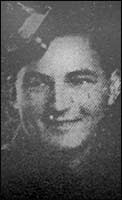 Rushden Echo, 18th August 1944, transcribed by Peter Brown Rushden Echo, 18th August 1944, transcribed by Peter Brown
Head Wounds - Rushden D-Day Warrior Now in England
Pte. D. Walden, only son of Mr and Mrs J. Walden, of 108, Glassbrook-road, Rushden, has been wounded in Normandy and is now back in this country in hospital. His parents visited him in hospital and found that he had been wounded in the head. Pte. Walden is 19½ years of age and joined the Army in April, 1943, going to Normandy on D-Day. Formerly he had worked as a shoe finisher for Messrs A. Sargent and Sons and joined the Home Guard at 16½ years of age.
|
|
The Rushden Echo and Argus, 18th August, 1944, transcribed by Gill Hollis
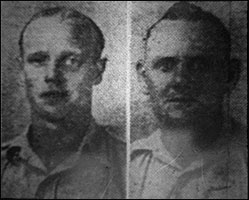 |
|
Walter Cox & Bill Meadows
|
Old Friends
Walter Cox, Royal Signal Corps, now in Italy, writes his parents, Mr. and Mrs. E. W. Cox, of 41, St. Margaret’s-avenue, Rushden, of a meeting with another Rushden man in North Africa a short time back.
The man he met, a friend of pre-war days, was Bill Meadows – incidentally the first local man he has met since going overseas – and the above photograph was taken after the meeting.
Walter Cox has been in the Army two-and-a-half years and abroad for two. He is 33 years of age and used to work at Messrs. Whitworth’s flour mills, Wellingborough.
|
|
The Rushden Echo and Argus, 25th August, 1944, transcribed by Gill Hollis
Missing Airman Returns Home
Rushden Man Back After Four Months
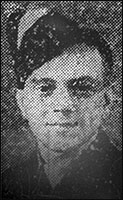 A Rushden airman, Sergt. Engineer Jack D. Dickens, R.A.F., of whom nothing had been heard since he failed to return from an operational flight four months ago, has arrived back in England safe and well. His parents, Mr. and Mrs. F. Dickens, of 31, Little-street, received a telegram from him on Saturday, and on Monday they had the joy of welcoming him home. He looked well, but bore traces of hard experiences which, for the present he was not allowed to relate. A Rushden airman, Sergt. Engineer Jack D. Dickens, R.A.F., of whom nothing had been heard since he failed to return from an operational flight four months ago, has arrived back in England safe and well. His parents, Mr. and Mrs. F. Dickens, of 31, Little-street, received a telegram from him on Saturday, and on Monday they had the joy of welcoming him home. He looked well, but bore traces of hard experiences which, for the present he was not allowed to relate.
Aged 23, Sergt. Dickens is an only child. He attended South End School, became an employee at the Rushden Co-operative Society’s grocery store in Queen-street, and joined the R.A.F. four years ago. It was after his 14th “op” that he was listed as “missing.”
|
|
The Rushden Echo and Argus, 25th August, 1944, transcribed by Gill Hollis
Rushden Sailors in Daring Action
Sunk U-Boat Under Fire From Shore Batteries
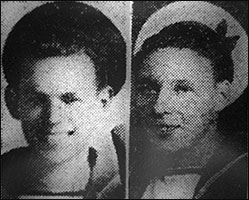 |
|
Sig. Jack Chapman & A/B Reg. Dickens
|
Two Rushden sailors were aboard one of a group of small British naval craft whose daring work under fire from German shore batteries in the Channel, has just been revealed.
The story is told by Commander R. A. Currie, R.N., who led the group of five frigates in H.M.S. Fame. The Rushden sailors – both serving on H.M.S. Hotspur – were Sig. Jack Chapman, youngest son of Mr. and Mrs. F. Chapman, 121, Park-road, and A/B Reg. Dickens, whose mother lives at 44, Little-street.
A few days after D-Day, the “little ships” found a U-boat in the Channel and crippled it near the shore. German coastal batteries opened up, but two of the frigates went in for the kill while the others ringed them round with smoke.
Next day – still under the enemy’s nose – the vessels picked up 140 survivors from a German ship which had sunk after a night action near the French cliffs. “We thought that was too many to let get back to the German coast,” explained Commander Currie.
The Germans were very surprised and disgruntled when they found they were being rescued not by their own ships but by the enemy.
Finally the frigates went right in-shore to pick up 40 floating survivors from German aircraft. Planes were falling all round them in the course of a fierce air battle in which the Germans were losing heavily.
|
|
The Rushden Echo and Argus, 1st September, 1944, transcribed by Gill Hollis
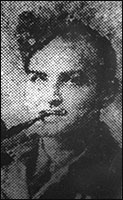 A Broken Thigh - Rushden Airman’s Accident in Italy A Broken Thigh - Rushden Airman’s Accident in Italy
Official news has been received that L.A.C. Eric James Lickerish, R.A.F., whose wife resides at 37, Spencer-road, Rushden, sustained a broken thigh as the result of an accident in Italy on August 23rd and has been moved to a British General Hospital in North Africa. One of the messages states that he was placed on the “seriously ill” list on August 25th.
L.A.C. Lickerish is the son of Mr. and Mrs. J. W. Lickerish, of Wymington, and lived in the village prior to joining the R.A.F. three-and-a-half years ago, being employed at Messrs. John White’s factory in Newton-road, Rushden, and playing football for Rushden Methodists. His marriage to Miss Audrey Garrod took place in 1941.
|
|
The Rushden Echo and Argus, 1st September, 1944, transcribed by Gill Hollis
Radio Message From Gibraltar - Rushden Soldier to be Heard Next Sunday
Driver Roland Ernest Bayes, R.E., whose home is at 1, Harborough-road, Rushden, will be heard in the B.B.C. Forces Programme at 9.15 a.m. next Sunday. His message to his relatives and friends at home has already been recorded, and as he has been in Gibraltar since January, 1942, his wife, his six-years-old daughter and his parents, Mr. and Mrs. R. E. Bayes, will be particularly happy to hear his voice.
Now aged 27, Dvr. Bayes joined the Army in November, 1939, and took part in the early campaign in France and the famous withdrawal from Dunkirk. He went to Gibraltar in 1941 and had six weeks’ leave at the end of that year.
Before the war he worked for Messrs. Drabble and Co., builders, and was associated with the Park-road Baptist Church and Boys’ Brigade.
|
|
The Rushden Echo and Argus, 1st September, 1944, transcribed by Gill Hollis
Rescued From Sea - Rushden Airman Helps to Save Italian
The rescue of an Italian prisoner of war by British lads on the Mediterranean coast is described in a letter from L.A.C. Roy Ingram, R.A.F., to his parents, Mr. and Mrs. H. V. Ingram, of “Libertus,” Shirley-road, Rushden.
L.A.C. Ingram joined the R.A.F. three years ago and has been serving overseas nearly two years. He used to belong to Rushden Swimming Club and also did a good deal of swimming as a pupil at Wellingborough Grammar School.
“We had rather a bad ‘do’ on Monday whilst bathing.” he writes. “We were doing a spot of sun bathing on the beach when we heard cries for help from a couple of Italian prisoners of war. I managed to reach one and brought him in to a human chain the lads had formed who dragged him in. The other ‘Evetie’ wasn’t so fortunate, as no-one could reach him. He was washed in about 10 minutes later, but despite artificial respiration given by some English nurses on the beach, they failed to bring him round.”
|
|
Rushden Echo & Argus, 8th September 1944
Wymington’s Fame Reaches Italy
Air Crash Rescue Story - In Forces Newspaper
As a local lad, born and bred at 127 Newton-road, Rushden, Cpl. K. Ambridge, R.A.F., from the Central Mediterranean, "I felt just a little moved this morning to read in the 'Union Jack' the doings of some of our neighbours at Wymington."
He sends a copy of "Union Jack" for Saturday, August 26th, containing under a prominent heading, "English Village in Spotlight of Fame," the story of eight Wymington men and a Czechoslovakian soldier who rescued American airmen from the blazing wreckage of a Flying Fortress.
Cpl. Ambridge adds "I think you will be interested to find that our locality is making itself known even here in Italy." He sends best wishes to Rushden, and hopes to see the old town soon.
|
|
Rushden Echo & Argus, 15th September 1944
Burned - Rushden Soldier's Gift for Church Rebuilding
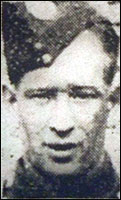 A Rushden soldier has given the first subscription for the rebuilding of a French church which was destroyed by the retreating Germans in August. He is Lce-Cpl. Stanley W. Bass of 67, Harborough-road, and the story is told in a letter to his wife. "We went into a village after driving Jerry out. He had set fire to it and the lovely little church was burnt to the ground. You could see the people looking on with tears in their eyes as it burned. It touched me. I went and spoke to the vicar, who was in tears as well as all the others, and he took me inside his house and made me quite at home. A Rushden soldier has given the first subscription for the rebuilding of a French church which was destroyed by the retreating Germans in August. He is Lce-Cpl. Stanley W. Bass of 67, Harborough-road, and the story is told in a letter to his wife. "We went into a village after driving Jerry out. He had set fire to it and the lovely little church was burnt to the ground. You could see the people looking on with tears in their eyes as it burned. It touched me. I went and spoke to the vicar, who was in tears as well as all the others, and he took me inside his house and made me quite at home.
"A lot of people came to me while I was there and quite a number could speak English, so I felt at home. The vicar gave me six eggs for my dinner, and I shared them among my mates—it was grand to have an egg again.
"I thought of all the money I had, and that it would be a good idea if I started a fund for a new church; so I gave them 1,500 francs, and the vicar was so pleased that he gave me a lovely souvenir after first blessing it."
|
|
Rushden Echo & Argus, 29th September 1944
Grateful—An ex-member of the Rushden A.T.C. Squadron, now serving with the R.A.F. in the Middle East, sends and airgraph in which he expresses appreciation of the training he received as a cadet. Sgt. P. Langdon says: Without my training in your Squadron I doubt if I would be where I am today, and I do not mean what country I'm in. I had to be out here and actually in the R.A.F. to fully realise what a swell job you and your fellow officers are doing especially F/O Faulkner. I am sure that when I return all my old buddies will have joined up and that there will be all new faces in your Squadron. May I take this opportunity to wish them all the best and to ask them to keep up the standard of the original members of 390 Squadron."
|
|
Rushden Echo & Argus, 6th October 1944
Stretcher Bearer Wounded - Rushden Man Who Landed on D Day
Pte William Newman, elder son of Mr and Mrs F Newman, of 11 Alfred-street, Rushden, a stretcher bearer with an infantry regiment who went to France on D Day, has returned to this country slightly wounded in the right arm.
Pte Newman who is now in hospital, was last heard of in Holland before his parents received his telegram announcing that he was wounded. He is 22 years of age and joined the Army in January 1942, afterwards serving in the Middle East and Sicily. He was a scholar of the Alfred-street School, worked for Messrs Walter Sargent and Co., and attended the Park-road Methodist Church.
His younger brother is with the R.A.M.C. in this country.
|
|
The Rushden Echo & Argus, 13th October, 1944, transcribed by Gill Hollis
Rushden Glider Man Missing
Was Probably In Second Arnhem Landing
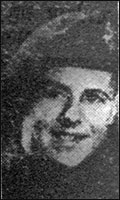 A Rushden glider-borne fighter, Lce-Cpl. David H. Shellard, of the Border Regiment, is reported “missing since September 25th.” It is assumed that he took part in the second landing at Arnhem. A Rushden glider-borne fighter, Lce-Cpl. David H. Shellard, of the Border Regiment, is reported “missing since September 25th.” It is assumed that he took part in the second landing at Arnhem.
L/Cpl. Shellard is the eldest son of Mrs. L. R. Shellard, of 5, Hall-avenue, Rushden, and Mr. F. Shellard, who is in business at Port Elizabeth, South Africa. He is 21 years of age and was in the glider landings on Sicily, later serving in Italy. His mother received a field card from him on the Tuesday following the Arnhem landings.
A soldier for four years, Lce-Cpl. Shellard used to work for Messrs. R. Tarry and Co., Ltd., boot manufacturers.
|
|
The Rushden Echo & Argus, 13th October, 1944, transcribed by Gill Hollis
Rushden Parachute Man Safe - Reported Missing, Then In Dutch Hands
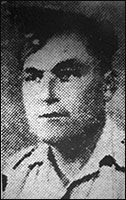 News that her husband was “missing in North West Europe” reached Mrs. L. G. Glidle, at 6, Washbrook-road, Rushden, on Saturday, but was followed on Monday by a telegram which stated that he was safe and in Dutch hands. News that her husband was “missing in North West Europe” reached Mrs. L. G. Glidle, at 6, Washbrook-road, Rushden, on Saturday, but was followed on Monday by a telegram which stated that he was safe and in Dutch hands.
The soldier is L/Cpl. Christopher Herbert Glidle, of a Paratroop Regiment. Aged 28 years, he joined the Army in November, 1940, and went to Madagascar, India, Persia and North Africa. It was while he was in N. Africa that he volunteered to be a parachutist. He went on to Italy and returned to England at Christmas, 1943, remaining in this country until the airborne troops went to Holland.
He used to be employed by Messrs. Walter Sargent and Co. His mother, Mrs. A. Smith, lives at 7, Bedford Cottages, Rushden. His father was killed in the last war.
|
|
The Rushden Echo & Argus, 20th October, 1944, transcribed by Gill Hollis
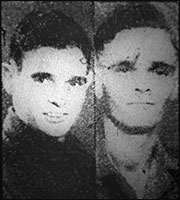 Brothers Meet In Hospital Brothers Meet In Hospital
Though he has been suffering from dysentery, Gnr. Ron E. Freeman, son of Mr. and Mrs. S. F. Freeman, 107, Newton-road, Rushden, thinks this is his lucky year. In March, while serving in the Far East, he encountered his sailor brother, Dennis. Now he sends news that after transfer to a Middle East hospital he has been visited by his eldest brother, Pte. Jack Freeman, R.A.O.C., whom he had not seen for over three years.
Jack and Ron were Territorials together before the war, and afterwards served together for a time in England. Ronald says that his brother, who looked fit and well, reached the hospital at seven in the morning and woke him up, staying two days and enjoying some long bedside talks.
|
Rushden Echo, 27th October 1944, transcribed by Kay Collins
Known to be Wounded - Rushden Parachutist Missing at Arnhem
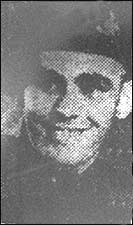 Another Rushden man believed to have been at Arnhem, and now reported “missing on the 18th September,” is Pte. Gordon Wm. Bridgeford, South Staffordshire Regiment, eldest son of Mr and Mrs Eli Wm. Bridgeford, of 59 Irchester-road, Rushden. His parents received from the War Office last Friday a notice which stated that he was known to be wounded. Another Rushden man believed to have been at Arnhem, and now reported “missing on the 18th September,” is Pte. Gordon Wm. Bridgeford, South Staffordshire Regiment, eldest son of Mr and Mrs Eli Wm. Bridgeford, of 59 Irchester-road, Rushden. His parents received from the War Office last Friday a notice which stated that he was known to be wounded.
Pte. Bridgeford is 25 years of age and has been in the Army for almost five years. He took part in the glider landings on Sicily and came down in the water, remaining there for ten hours. Since Christmas and up to the Holland landings, he was in this country.
Previously he was employed by Mr Drabble, builder, and was a member of the Adult School for a short time before call-up. He took part in boxing at Rushden Windmill Club, evidently inheriting this talent from his grandfather “Butcher” Bridgeford, who was the last of the old bare-fisted fighters in this district.
Two brothers are in the Army, one being in Italy, and two brothers-in-law are serving—one in India and the other in Belgium. Until recently a sister was serving in the A.T.S.
|
Rushden Echo & Argus, 27th October 1944, transcribed by Kay Collins
Wounded in Hand and Arm
Pte. Charles Frederick Dowsett, Northamptonshire regiment, of Rushden, has been wounded in the left arm and hand while serving in the Central Mediterranean theatre of war. He is the second son of Mr. and Mrs. C. Dowsett, of 57 Sartoris-road.
Aged 30 years, Pte. Dowsett has been in the Army over four years and abroad for seven months. Previously he was employed at Messrs. John White’s Lime-street factory.
His elder brother has been discharged from the Army, and the younger was repatriated from Germany this year.
|
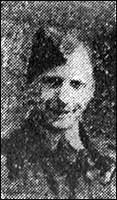 Rushden Echo & Argus, 27th October 1944, transcribed by Kay Collins Rushden Echo & Argus, 27th October 1944, transcribed by Kay Collins
Bombed in Berlin – Airman Completes Forty Operations
Berlin raids and operations directly connected with the liberation of Europe figure in the record of Sgt.-Flight Engineer Jack Billingham R.A.F., of 6 Headingley-road, Rushden, who has just completed his tour of 40 “ops.”
Sgt. Billingham is aged 38 and volunteered for the Air Force in May 1943, taking his wings last March. He is the eldest son of Mr. and Mrs. J. Billingham, of Kempston, and took up residence in Rushden on his marriage to Miss B. Coleman, of Harborough-road, in 1931, being employed by Messrs. A. Sanders Ltd., as a carpenter and joiner. For three years he served in the Rushden A.R.P. Rescue Squad.
|
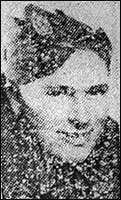 Rushden Echo & Argus, 27th October 1944, transcribed by Kay Collins Rushden Echo & Argus, 27th October 1944, transcribed by Kay Collins
Cyclist Wounded – Rushden Trooper Hit in Right Arm
Mr. and Mrs. A. Minney, of 4 Ebenezer-terrace, Newton-road, Rushden, have received news that their only son, Trooper Gordon Minney, Recce. Regt., has been wounded in the right arm while serving in Europe.
He is 23 years of age and has been in the Army for four years and nine months, going to Normandy on D Day.
Prior to his enlistment he was a cycling enthusiast and won many cups, still holding the cup for the best all-rounder in the Irchester Wheelers. He was employed by the Coxton Shoe Company and received his education at the Newton-road school.
|
Rushden Echo & Argus, 10th November 1944, transcribed by Kay Collins
Rushden Brothers – Reunion at Barracks in Belgium
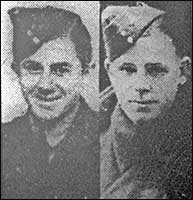 Two Rushden brothers, Cpl. John Gray, Pioneer Corps, and A.C. Jimmy Gray, R.A.F., met in Belgium on October 27th. Two Rushden brothers, Cpl. John Gray, Pioneer Corps, and A.C. Jimmy Gray, R.A.F., met in Belgium on October 27th.
Cpl. Gray, the elder brother, writes to his wife, at 10 Beaconsfield-place, Rushden, and says that he was called to the barrack gates and there found his brother, who had obtained his address from the Military Police. They spent the day together at the camp and the following day went to A.C. Gray’s camp, six miles away.
The brothers are the sons of Mr. and Mrs. J. Gray, of 35 St. Peter’s-avenue, Rushden. Cpl. Gray is 25 years of age, has been in the Army four years, and went to France on D. Day. He and his wife have a fifteen-month-old daughter.
A.C. Gray, just turned 19, has been in the R.A.F. under 12 months. Both brothers worked at Messrs. John White’s Park-road factory.
|
Rushden Echo & Argus, 10th November 1944, transcribed by Kay Collins
Back from Burma – Rushden Sergt. Describes “War’s Worst Front”
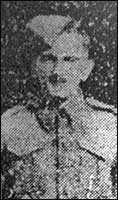 After being absent from this country since early in 1941, and serving in India, Ceylon and for the last twelve months in Burma, Sergt. Reginald Brown has returned to his home at 13 Beaconsfield-terrace, Rushden, for a month’s leave. After being absent from this country since early in 1941, and serving in India, Ceylon and for the last twelve months in Burma, Sergt. Reginald Brown has returned to his home at 13 Beaconsfield-terrace, Rushden, for a month’s leave.
Sergt. Brown belonged to the 20th Indian Division, which comprised three British regts. And four Indian regts. For about nine months this Division fought a difficult rearguard action, denying the Japs their easiest and shortest route to the Imphal Plain.
Describing the country, Sergt. Brown summed it up by saying “There is plenty of mud, leeches and lice.” For the most part the troops lived dug in underground, covered by wood, etc. They are rather annoyed because they are not getting enough publicity in the English papers for the fighting they are doing in perhaps the worst theatre of war.
Out there Sergt. Brown met two local men, Frank Knight, of Sartoris-road, who was afterwards wounded in the head, and Gerald Ekins, of Blinco-road.
Sergt Brown is married and is the only son of Mr. F. Brown, a former Rushden police sergeant, and Mrs. Brown of 11 Windmill Banks, Higham Ferrers. He has been in the Army nearly five years, used to work in the stockroom at Messrs. John White’s factory at Higham Ferrers, and belonged to the Y.M.C.A. at Rushden.
Two sisters are on war service—one in the N.A.A.F.I., and the other in the A.T.S.
|
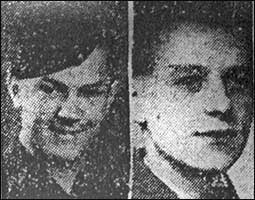 Rushden Echo & Argus, 10th November 1944, transcribed by Kay Collins Rushden Echo & Argus, 10th November 1944, transcribed by Kay Collins
Cousins Meet in Belgium
Rushden Men Now Keep in Close Touch
Cpl. Leslie Cox, R.A.F., and A.C.2 Philip Clarke, R.A.F., two Rushden cousins met recently in Belgium and wrote home to tell their parents. It appears that Leslie traced Phillip to his camp and the two had tea together. As they are only three miles apart they have met frequently since then.
Both aged 21 years, they are the grandsons of Mr. William Cox, of Co-operative-row, Rushden.
Cpl. Cox, a former member of the Salvation Army band, has been in the R.A.F. for 2½ years and went to France shortly after D. Day, returning home in September to marry an Aldershot lady. He used to work for Messrs. A. Sanders Ltd., builders. His cousin has been in the Service for two years and went to France more recently. He was a member of the A.T.C. and worked for Messrs. H. P. Hodge Ltd.
|
|
The Rushden Echo and Argus, 10th November, 1944
Wounded in Arm - Rushden Man in Army of Liberation
L/Cpl. George Joyce, Leicestershire Regiment, has been wounded in the left arm while serving in the European theatre of war. His wife, Mrs. I. D. Joyce, of 85, Park-road, Rushden, received the official news last Friday.
L/Cpl. Joyce went to France on July 1st and was wounded in Holland. He is now in this country. He is 32 years of age and has been in the Army nearly four years. Previously he worked for Messrs. C. W. Horrell, Ltd., boot manufacturers, and was a member of the Independent Wesleyan Church and choir.
His father, Mr. T. Joyce, resides at 10, Sharwood-terrace, Irchester.
|
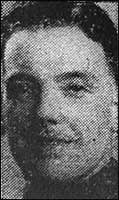 Rushden Echo & Argus, 24th November 1944, transcribed by Kay Collins Rushden Echo & Argus, 24th November 1944, transcribed by Kay Collins
Seriously ill – Rushden Guardsman has Diphtheria
Sergt. Albert Edward Cross, Coldstream Guards, husband of Mrs. A. E. Cross, of 78 High-street, Higham Ferrers and eldest son of Mr. and Mrs. A. A. Cross, of “Elbrita,” Hall-avenue, Rushden, is seriously ill with clinical diphtheria.
Last time he wrote home he was in Brussels. He joined the Army from the Reserves in 1938, and when he was wounded in 1940 he was Rushden’s first Army casualty. Previously he had been employed by Messrs. John White.
His next brother is in Holland and the third is still in this country.
|
|
The Rushden Echo and Argus, 1st December, 1944
Rushden Soldier’s Newest Ally
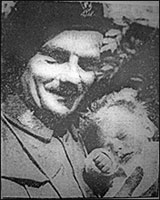 Though S.Q.M.S. Kenneth Price posed for this happy picture in Holland, it is obvious that the handling of a baby was not “Dutch” to him. The gallant Hussar married Miss Violet Barker, of “Chadwell,” Hall-avenue, Rushden, at Christmas, 1942, and is now serving with the 11th Armoured Division. Though S.Q.M.S. Kenneth Price posed for this happy picture in Holland, it is obvious that the handling of a baby was not “Dutch” to him. The gallant Hussar married Miss Violet Barker, of “Chadwell,” Hall-avenue, Rushden, at Christmas, 1942, and is now serving with the 11th Armoured Division.
In Holland recently he was able to help a Dutch family, who rewarded him with friendship and hospitality. When he nursed the seven-weeks-old baby they took this photo, which has been published in a Dutch newspaper with the caption, “Safe in the hands of the Allies.”
A native of Hull, S.Q.M.S. Price was in pre-war days a reporter on the “Chicago Tribune,” and covered the Spanish Civil War for that paper. He and his Rushden wife, who is in the W.A.A.F., have been invited to visit his Dutch friends after the war.
|
|
The Rushden Echo and Argus, 8th December, 1944
First “Ballot Leavers” Home
Rushden Men from Italy and Middle East
Two soldiers from the Italian front who were lucky in the new ballot scheme are among the Rushden Service men now on leave from the fighting zones.
When Trooper Robert Buckeer, of a famous cavalry regiment, knocked on the door of 44, Talbot-road, he had come straight from the front line in Italy after less than 12 months’ service there and two years altogether in the Army. He was a lucky winner in the leave ballot, and first knew of his good fortune on November 13th.
The trooper, who is aged 20, found his luck wavering when no-one answered his knock, and had to stay with neighbours until his wife and mother-in-law returned from a cinema. He is the son of Mr. and Mrs. R. Buckeer, of 74, Tennyson-road, and has two soldier brothers – one in Holland and one in Italy.
“Last night,” he said on Wednesday, “I heard on the wireless that my regiment had entered Ravenna, so that’s where I should have been.” He will spend 33 days in England.
Trooper Buckeer served in the Middle East before going to Italy, and visited Tobruk, Benghazi, Cairo, Palestine and Syria. He spent two weeks in a Palestine hospital. Crossing to Italy last August, he changed from driver to machine-gunner. He took part in the fighting for the Gothic Line and was in many fierce actions among the hills.
Corporal Saw the Pope
After two years’ service in North Africa, Sicily and Italy, Cpl. George Thomas Skellham, Royal Corps of Signals, of 21, East-grove, Rushden is also on 33 days’ “ballot” leave.
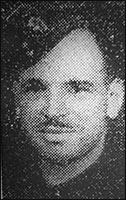 Cpl. Skellham, who belongs to a special wireless section, was told of the scheme in Italy at Midday on November 14th. In the afternoon he learned that he was the lucky one out of 95, and next morning he was on his way to Naples on the first step of the journey home. An airmail from a transit camp at Naples advised his parents, Mr. and Mrs. J. T. Skellham, in advance of his homecoming. Cpl. Skellham, who belongs to a special wireless section, was told of the scheme in Italy at Midday on November 14th. In the afternoon he learned that he was the lucky one out of 95, and next morning he was on his way to Naples on the first step of the journey home. An airmail from a transit camp at Naples advised his parents, Mr. and Mrs. J. T. Skellham, in advance of his homecoming.
Going to N. Africa two years ago, Cpl. Skellham went on to Sicily when the campaign was nearly over there, and then on to Salerno a week after the initial landing. Since then he has followed the progress of our troops through Italy.
During his travels Cpl. Skellham has looked round the ruins of Pompeii and seen the eruption of Vesuvius. Four days’ leave was spent in Naples, and on another occasion he was able to pay a visit to Rome and St. Peter’s Church, where the Pope was holding audience. He was surprised to hear immediately afterwards an Irish Guards band strike up “The Mountains of Mourne.”
Cpl. Skellham says that the ancient parts of Rome are beautiful; but the modern structure, particularly Mussolini’s Palace, are “cheap looking.” The people of North Italy are more hard-working than those of the South.
On several occasions he was able to meet his brother, Sergt. W. B. Skellham, R.A.S.C., who is also serving in Italy.
Formerly a school teacher at Birmingham Cpl. Skellham is 38 years of age and has been in the Army for 3½ years. He has another brother with the Ordnance Corps in this country and a sister in the A.T.S.
Four Years in Middle East
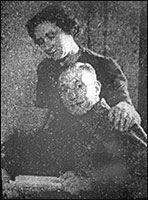 Driver Herbert Oakley, R.A.S.C., “walking in” on his parents at 66, Tennyson-road, was on his first leave – not by ballot – after four years’ duty in the Middle East, where he was sent after only four months’ training as a soldier. Driver Herbert Oakley, R.A.S.C., “walking in” on his parents at 66, Tennyson-road, was on his first leave – not by ballot – after four years’ duty in the Middle East, where he was sent after only four months’ training as a soldier.
Driver Oakley, aged 24, is unmarried and formerly worked for Messrs. B. Denton and Son, Station-road.
When he reached the Middle East he took part in General Auchinleck’s siege of Tobruk (1941) and followed through with the 8th Army almost to Tripoli. He was in the subsequent retreat, serving as a driver of general supplies, and served at Knightsbridge. At Mersa Matruh he was wounded in the shoulder. Then followed six months in South Africa, more fighting at El Alamein, and 18 months at Malta, working in the docks.
|
|
The Rushden Echo and Argus, 8th December, 1944
Serious Injuries - Rushden Airman on West Front
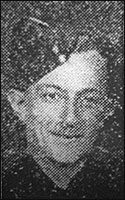 A.C.2 Clarence Edward Tye, of Rushden, an assistant armourer in the R.A.F., has been reported seriously injured in the head as a result of enemy action. His wife, who lives at 7, Highfield-road, received the first news on November 30th. A.C.2 Clarence Edward Tye, of Rushden, an assistant armourer in the R.A.F., has been reported seriously injured in the head as a result of enemy action. His wife, who lives at 7, Highfield-road, received the first news on November 30th.
Last time A.C.2 Tye had written he was in Holland. Aged 39, he has been in the service for 12 months and went to France during August. Formerly he was employed at Messrs. John White’s Newton-road factory and belonged to the Windmill Club. There is one son, aged 16, who is a lance-corporal in an Army Technical School.
A.C.2 Tye is the eldest son of Mr. Roland Edward Tye, of 83, Westfield-avenue, Rushden.
|
|
The Rushden Echo and Argus, 8th December, 1944 [On the fold so words missing]
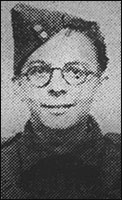 Wounded In Germany Wounded In Germany
Rushden Soldier Flown To Welsh Hospital
Mr. and Mrs. R. Jephcote, of “Thimbleby,” Hall-avenue, Rushden, have learned that their only son, Pte. Rufus George Jephcote, D***** Regiment, has a broken leg and a small wound on the other leg. He has written from a hospital in Cardiff, saying that after a second operation he is comfortable, and that he was wounded in Germany and flown from Belgium last Saturday.
Pte. Jephcote is 19 years of age. He has been in the Army for ** months and went to France at the end of July. Previously he had assisted his father with his hairdressing business in Cromwell-road. He was educated at the Newton-road School.
|
|
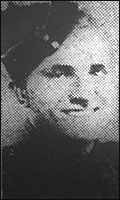 The Rushden Echo and Argus, 15th December, 1944 The Rushden Echo and Argus, 15th December, 1944
Weeks of Illness - Rushden Man Pays Price of Burma Campaign
Sign. Peter Tilley, R.C.S., only son of Mr. and Mrs. S. Tilley, 6, Carnegie-street, Rushden, has been in hospital for several weeks with malaria, followed by jaundice. In a letter dated November 30th he mentions going with other patients to a party at a District Commissioner’s house, where an assortment of cakes were served.
Sign. Tilley has been in the Army over two years and in the Burma zone 18 months. He is aged 21 and before joining the Army worked in the office of [words missing] Ltd., and was a member of the Rushden Mission Church and Cricket Club.
|
|
The Rushden Echo and Argus, 15th December, 1944
Serious Injuries - Rushden Soldier Flown Back To England
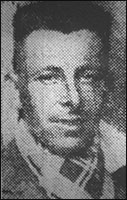 Pte. William Knight, Oxford and Bucks Regiment, of 26, Roberts-street, Rushden, has been seriously injured through enemy action and is suffering from concussion and shell shock. Pte. William Knight, Oxford and Bucks Regiment, of 26, Roberts-street, Rushden, has been seriously injured through enemy action and is suffering from concussion and shell shock.
The injuries were received in Holland, and Pte. Knight was in a French hospital for five weeks before being flown back to England. He is now in the Royal United Hospital, Bath. The brain specialist performed a successful operation on December 7th, and he is now slowly recovering.
Pte. Knight is the only son of Mr. and Mrs. W. Knight, of 41, Westfield-avenue, Rushden. His wife and small son live in Roberts-street. Aged 34 years, he has been in the Army for 12 months and went to France the third week in August. He was formerly employed by Messrs. John White, Ltd., at Higham Ferrers, and is an old member of the Rushden Adult School.
|
|
The Rushden Echo and Argus, 22nd December, 1944
Comrades in Greece
The first story to reach Rushden from newly-liberated Greece was received in a letter to the Editor of the “Echo and Argus.” The writer was Sergeant R. Fensome, a Rushden man who is serving with the Corps of Military Police.
In his letter, Sergeant Fensome encloses a photograph of himself in the company of two tough-looking men, described as “Greek policemen,” partaking of liquid refreshment and standing at the doorway of a typical Greek homestead. When he landed in Greece to take part in the large-scale relief work which is going on, he had “a very good welcome.”
Sergeant Fensome has had a varied career. Leaving Rushden in 1932, he served in the Grenadier Guards for four and a half years, two years of which were spent in Cairo. Then followed two years in the Metropolitan Police, when he was stationed at Peckham and Brixton. When the war began, Sergeant Fensome became a Military Policeman, and in June 1942 began a tour of duty with the 8th Army which took him from El Alamein to Tunis and then across to Italy. Since then he has been employed in Italy teaching Italian soldiers traffic and police duties.
“Some of the Rushden boys have been serving in the same theatre as myself,” writes Sergeant Fensome, “but I have not been lucky enough to meet them. Most of them are school colleagues of mine, and if any of them are now serving in Greece I would like to contact them.”
Sergeant Fensome’s wife and son are living at 135, Queen-street, Rushden.
|
|
The Rushden Echo and Argus, 29th December, 1944
First Time in Three Years - Rushden Brothers Meet Abroad
For the first time in nearly three years, Sergt. Robert W. Fensom, of the Grenadier Guards, whose wife resides at 66, Upper Kings-avenue, Higham Ferrers, has met his brother, Sergt. Ronald Fensom, Northamptonshire Regiment.
The meeting was in Italy and occurred through Sergt. R. Fensom being sent on a course near his brother’s camp. They spent a day together. With Robert was Pte. Dennis Paragreen, of Rushden.
Robert Fensome has been in the Grenadier Guards for five years and abroad for 16 months. Formerly he was a local Scoutmaster and a Sunday School teacher at St. Mary’s Church, and with his friend, Pte. D. Paragreen, belonged to St. Mary’s Rovers.
Ron Fensom has been abroad over two years and took part in the Africa and Sicily campaigns. Before joining up he was employed by Mr. Robt. Marriott and belonged to the Baptist Boys’ Brigade.
The father, Mr. Thomas Fensom, is at Port Elizabeth, South Africa, and hopes to be joining his sons soon after the war. Sergt. R. W. Fensom’s home is with his aunt, Mrs. Upton, of 23, Brookfield-road, Rushden.
The two men have a younger brother, Cpl. G. Fensom, serving with the Royal Marines. All three have written to thank the townspeople of Rushden for “the splendid gifts” and to say that they receive “the good old ‘Echo and Argus’” regularly each week.
|
|
The Rushden Echo and Argus, 29th December, 1944
Baled Out From Two Planes
Rushden Airman Joins Caterpillar Club
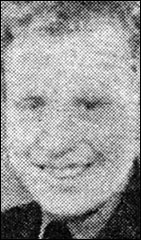 Membership of the Caterpillar Club is the “reward” gained by a Rushden airman, Sergt. Gordon Abrams, for twice baling out of ’planes. Membership of the Caterpillar Club is the “reward” gained by a Rushden airman, Sergt. Gordon Abrams, for twice baling out of ’planes.
Only son of the late Mr. Austin Abrams and of Mrs. F. Young, 125, St. Margaret’s-avenue, Rushden, Sergt. Abrams is a wireless operator. He first used his parachute in September when his bomber caught fire, and with the rest of the crew, he escaped injury.
Early this month another plane in which he was flying over Britain got into difficulties, and four of the crew, himself included, baled out. Again he was uninjured. The Pilot remained in the ‘plane and landed it safely.
Sergt. Abrams has made one operational flight over France. Formerly in the employ of Messrs. Sanders and Sanders, boot manufacturers, he was a member of the Rushden Mission Band and Church before joining the R.A.F. in June, 1940.
|
|